21st century
The 21st (twenty-first) century is the current century of the Anno Domini era or Common Era, in accordance with the Gregorian calendar. It began on January 1, 2001, and will end on December 31, 2100.[1] It is the first century of the 3rd millennium.
| Millennium: | 3rd millennium |
|---|---|
| Centuries: |
|
| Timelines: |
|
| State leaders: |
|
| Decades: |
|
| Categories: | Births – Deaths Establishments – Disestablishments |
The first years of the 21st century were marked by the rise of a global economy and Third World consumerism, mistrust in government, deepening global concern over terrorism and an increase in private enterprise.[2][3][4] Effects of global warming and rising sea levels continued, with eight islands disappearing between 2007 and 2014.[5][6][7] The Arab Spring of the early 2010s led to mixed outcomes in the Arab world, resulting in several civil wars and governments overthrown.[8] The United States of America remains the only global superpower. While most member states of the European Union introduced a common currency, the Euro, the United Kingdom withdrew from the European Union. The 2019–20 coronavirus pandemic spread around the world, leading to socioeconomic disruption.
The Third Industrial Revolution which began around the 1950s continued into the late 20th century, and started to transition into Industry 4.0 and the Fourth Industrial Revolution in the beginning of the 21st century.[9]
Due to the proliferation of mobile devices, more than half of the world's population have access to the internet (2018 estimate[10]), allowing humans to be more interconnected than ever before. DNA sequencing costs continued to fall: the first human genome cost three billion dollars;[11] in 2018, sequencing one human genome cost about $1000.[12]
Transitions and changes
Technology and society
Advances in technology such as ultrasound, prenatal genetic testing and genetic engineering are changing the demographics and has the potential to change the genetic makeup of the human population. Because of sex selective abortion, fewer girls have been born in the 21st century (and since the early 1980s) compared to past centuries, mostly because of son preference in East and South Asia. In 2014, only 47 percent of Indian births were of girls.[13] This has led to an increase in bachelors in countries such as China and India. The first genetically modified children were born in November 2018 in China, beginning a new biological era for the human species and raising great controversy.
Anxiety[14] and depression[15] rates have risen in the United States and many other parts of the world. However, suicide rates have fallen in Europe and most of the rest of the world so far this century, declining 29% globally between 2000 and 2018, despite rising 18% in the United States in the same period. The decline in suicide has been most notable among Chinese and Indian women, the elderly, and middle-aged Russian men.[16][17]
Knowledge and information
The entire written works of humanity, from the beginning of recorded history to 2003, in all known languages, are estimated to be at five exabytes of data.[18][19] Since 2003, with the beginning of social media and "user-generated content", the same amount of data is created every two days.[20] The advancement of the sum total of human knowledge and information continues to grow at an exponential rate.
Telecommunications in the early 21st century are much more advanced and universal than they were in the late 20th century. Only a few percent of the world's population were Internet users and cellular phone owners in the late 1990s; as of 2018, 55% of the world's population is online and as of 2019, an estimated 67% own a cell phone.[21] In the 2010s, artificial intelligence, mostly in the form of deep learning and machine learning became more prevalent, and is prominently used in Gmail and Google's search engine, as well as in banking, the military and other niches. In 2017, 14% of the world's population still lacked access to electricity.[22]

In 2001, Dennis Tito became the first space tourist, beginning the era of commercial spaceflight. Entrepreneurs such as Elon Musk and Richard Branson are working towards commercial space exploration, colonization and tourism, and China and India have made substantial strides in their space programs. On January 3, 2019, China landed a robotic spacecraft on the far side of the Moon, the first to do so.[23]
Culture and politics
War and most kinds of crime and violence have declined considerably compared to the 20th century; such a period of "relative peace" between major powers has not been documented in human history since the Roman Empire. Malnourishment and poverty are still widespread globally, but fewer people live in the most extreme forms of poverty, relative to recorded history. In 1990, approximately one-in-four people were malnourished, and nearly 36% of the world's population lived in extreme poverty; by 2015, these numbers had dropped to approximately one-in-eight and 10%, respectively.
The Facebook–Cambridge Analytica data scandal drew international attention to the possible negative effects of social media in influencing citizen's views, particularly with regard to the 2016 United States presidential election.
Population and urbanization
The world population was about 6.1 billion at the start of the 21st century, and reached 7.7 billion by January 2019. It is estimated to reach about 8.6 billion by the year 2030,[24] and 9.8 billion by the year 2050. According to the United Nations World Urbanization prospects, 60% of the world's human population is projected to live in megacities and megalopolises by 2030, 70% by 2050, and 90% by 2080. By 2040, more than 5 times the current global gross domestic product is expected to be invested in urban infrastructure.[25]
Life expectancy has increased as child mortality continues to decline. A baby born in 2016, for example, can on average (globally) expect to live 72 years—26 years longer than the global average of someone born in 1950. Ten million Britons (16% of the population of the United Kingdom) are expected to live to 100 or older.[26]
Climate change remains a serious concern; UN Chief António Guterres, for instance, has described it as an "existential threat" to humanity.[27] Furthermore, the Holocene extinction event, the sixth most significant extinction event in the history of the Earth, continues with the widespread degradation of highly biodiverse habitats as a byproduct of human activity.[28]

Economics, education and retirement
Economically and politically, the United States and Western Europe were dominant at the beginning of the century; by the 2010s, China became an emerging superpower and by some measures the world's largest economy. In terms of purchasing power parity, India's economy became larger than that of Japan around the year 2011.[29]
There is an ongoing impact of technological unemployment due to automation and computerization: the rate at which jobs are disappearing—due to machines replacing them—is expected to escalate.[30] Automation alters the number of jobs and the skills demands of industries. As of 2019, the production output of first world nations' manufacturing sectors was doubled when compared to 1984 output; but it is now produced with one-third fewer workers and at significantly reduced operating costs.[31] Half of all jobs with requirements lower than a bachelor's degree are currently in the process of being replaced with partial- or full-automation.[32]
The World Economic Forum forecast that 65% of children entering primary school will end up in jobs or careers that currently do not yet exist.[33]
A rise in the retirement age has been called for in view of an increase in life expectancy and has been put in place in many jurisdictions.[34][35]
Pronunciation
There is a debate among experts and the general public on how to pronounce specific years of the 21st century in English. Regarding this, academics suggested that since former years such as 1805 and 1905 were commonly pronounced as "eighteen oh five" or "nineteen oh five", the year 2005 should naturally have been pronounced as "twenty oh five".[36] A less common variation would have been "twenty nought five". Generally, the early years of the 21st century were pronounced as "two-thousand (and) five", with a change taking place around 2010, where pronunciations often shift between the early-year standard of "two-thousand and ten" and the traditional approach of "twenty-ten".
The Vancouver Olympics, which took place in 2010, was being officially referred to by Vancouver 2010 as "the twenty-ten Olympics". The latest timeframes for change are usually placed at 2020.[36]
According to The Stanley Kubrick Archives, in the press release for his film 2001: A Space Odyssey, film director Stanley Kubrick included specific instructions for journalists to refer to the movie as "two thousand and one" instead of the commonplace pronunciation of "twenty-oh-one". Kubrick said he did this in the hope that if the film became popular, it would influence the pronunciation of that year.[37]
Events
Politics and wars
Events
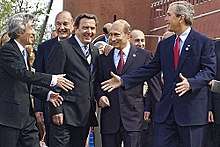
2000s
- 1998–2002 – The Second Congo War continued into the early 21st century. A 1999 ceasefire quickly broke down and a UN peacekeeping mission, MONUC, was unable to control the fighting. Troops from Rwanda and Uganda continued to support rebel groups against the Democratic Republic of the Congo and rifts also grew between Rwanda and Uganda as they accused each other of supporting rival rebel groups as well. Laurent Kabila, president of the DRC, was assassinated in January 2001 and his son, Joseph Kabila, took power. Throughout 2002 steps were made towards peace and Rwanda and Uganda both removed their troops from the country. On December 17, 2002, a massive treaty officially ended the war. However, the DRC only holds power in less than half of the country, with most of the eastern and northern portions still controlled by rebel groups, where there is still significant infighting. In addition, Rwanda still supports anti-DRC rebels and anti-Rwandan rebels continue to operate from the DRC. The war killed an estimated 3.9 million people, displaced nearly 5.5 million, and led to a widespread and ongoing famine that continues to result in deaths. Severe human rights violations continue to be reported.
- 2001 – The Nepalese royal massacre occurred on 1 June 2001, at a house on the grounds of the Narayanhity Royal Palace, the residence of the Nepalese monarchy. Ten members of the family were killed during a party or monthly reunion dinner of the royal family in the house. The dead included King Birendra of Nepal and Queen Aishwarya.
- 2001 – George W. Bush is inaugurated as the 43rd President of the United States. He is the second president from the Bush family.
- 2001 – Gloria Macapagal-Arroyo becomes the second woman President of the Philippines and the first to be the child of a previous President, Diosdado Macapagal.
- 2001 – More than 200,000 anti-globalization protesters marched in Genoa, during the 27th G8 summit. Two demonstrators were killed by the Italian police. On July 21 a group of Carabinieri attacked the school Armando Diaz, seriously injuring many peaceful protesters. Prime Minister Silvio Berlusconi insisted that police used the minimum amount of force necessary to achieve their goals.
- 2001 – Nineteen al-Qaeda terrorists hijack four commercial airliners and crash two of them into the World Trade Center, one into the Pentagon and one into a field in Shanksville, Pennsylvania of the United States on September 11, killing nearly 3,000 people. The United States subsequently declares the War on Terror.
- 2001–2014 – The Northern Alliance and NATO-led ISAF invaded Afghanistan on October 7, 2001, and overthrew the Al-Qaeda-supportive Taliban government. Troops remained to install a democratic government, fight a slowly escalating insurgency, and to hunt for Al-Qaeda leader Osama bin Laden who was killed by American troops nearly 10 years later, on May 2, 2011. On December 24, 2014, NATO forces officially ended combat operations in Afghanistan; but forces still remain to the present.
- 2001 – The Netherlands become the first country in the world to legalize same-sex marriage.
- 2001 – After 15 years of negotiations, the People's Republic of China became a member of the World Trade Organization (WTO) on 11 December 2001.
- 2002 – The International Criminal Court (ICC) was established on July 1.
- 2002 – Switzerland, a neutral country, becomes a member of the United Nations, on September 10.
- 2002 – Jemaah Islamiyah, a violent Islamist group, claimed responsibility for the detonation of three bombs in the tourist district of Kuta on the Indonesian island of Bali. The attack killed 202 people and 209 people were injured.
- 2002 – After a long period of occupation by Indonesia, East Timor's independence is recognized by Portugal and by the UN.
- 2002 – Hu Jintao becomes the General Secretary of the Communist Party of China, making him the paramount leader of China after Jiang Zemin.
- 2003–present – In February 2003, a conflict in Darfur, Sudan, began and soon escalated into full-scale war. By 2008 it was believed that up to 400,000 people had been killed and over 2.5 million displaced. In 2005, the ICC decided that Darfur war criminals would be tried, and on July 14, 2008, Sudanese president Omar al-Bashir was charged with 5 accounts of crimes against humanity and 2 accounts of war crimes, although the ICC has no power to enforce these charges.
- 2003–2010 – The U.S.-led coalition invaded Iraq on March 20, 2003, and overthrew the government of Saddam Hussein (who was executed by the Iraqi government on December 30, 2006). Coalition troops remain in the country to install a democratic government and fight an escalating insurgency. In addition to an insurgency against the American presence, Iraq also suffered from a civil war for several years. The war was soon seen as the central front of the War on Terror by many governments, despite growing international dissatisfaction with the war. The total death toll has been estimated at near 150,000 but these estimations are highly disputed, with one highly disputed study guessing even over 1 million.[38] After the U.S.-led coalition initiated a troop surge in 2007, casualty numbers have decreased significantly. Combat ended, at least officially, in August 2010.
- 2003–2005 – A series of nonviolent revolutions known as the colour revolutions overthrew governments in Georgia, Ukraine, Kyrgyzstan, and Lebanon.
- 2003 – Libyan leader Muammar Gaddafi announced that Libya would voluntarily eliminate all weapons of mass destruction.
- 2004 – Ten explosions occurred at the Cercanías commuter train system of Madrid, Spain, on the morning of March 11. The explosions killed 191 people and injured around 2,000.
- 2004 – The European Union expanded by 10 countries (8 former communist countries, plus Malta and Cyprus).
- 2004 – Former U.S. president Ronald Reagan dies at the age of 93 after suffering nearly a decade from the Alzheimer's disease.
- 2004 – Palestinian leader and Chairman of the Palestine Liberation Organization Yasser Arafat dies in France, at the age of 75 from hemorrhagic stroke.
- 2004 – Gloria Macapagal-Arroyo gets re-elected as President of the Philippines, marking the first time that a woman was re-elected to the highest position in the country.
- 2004 – Massachusetts became the first U.S. state to legalize same-sex marriage.
- 2005 – Pope John Paul II dies and Joseph Ratzinger of Germany is elected as Pope Benedict XVI.
- 2005 – Four Islamic extremist suicide bombers set off three bombs in London; 56 people were killed, including the four suicide bombers.
- 2005 – Angela Merkel becomes the first female elected Chancellor of Germany.
- 2006–2008 – The dismantling of former Yugoslavia continued after Montenegro gained independence on June 3, 2006, and Kosovo declared independence on February 17, 2008. However, Kosovo's independence was disputed by Russia and many of its allies and was only partially recognized.
- 2006 – On July 12, Hezbollah crossed the border of Lebanon and captured two Israeli soldiers. Israel responded by sending troops across the border and bombing Hezbollah strongholds, while Hezbollah fired missiles on towns in northern Israel, approximately 6 each day. At the end of the war 1,200 Lebanese civilians, 500 Hezbollah fighteres, 44 Israeli civilians and 121 Israeli soldiers died. A ceasefire was signed on August 14, after which Israeli troops withdrew from Lebanon.
- 2006 – North Korea conducted its first nuclear test on October 9.[39] This was preceded by years of political wrangling with the U.S. over the status of their nuclear program.
- 2007–2008 – Nepal's centuries-old monarchy is overthrown, and the country becomes a republic.
- 2007 – Bulgaria and Romania join the European Union.
- 2007 – A civil war escalated in the Gaza Strip throughout June, which resulted in Hamas eventually driving most Fatah-loyal forces from the Strip. In reaction, Palestinian president Mahmoud Abbas dismissed Hamas prime minister Ismail Haniyeh and dissolved the Hamas-ruled parliament. Scattered conflict continues.
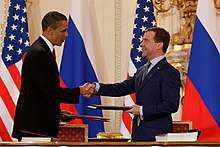
- 2007 – Pratibha Patil becomes the first woman to be elected President of India.
- 2007–2008 – Crisis follows the Kenyan presidential election of 2007, leading to the formation of a coalition government, with Mwai Kibaki as president and Raila Odinga as prime minister.
- 2007 – On 13 December, 27 EU member states signed the Treaty of Lisbon, and entered into force on 1 December 2009.
- 2008 – Kosovo unilaterally declared independence from Serbia. Serbia refuses to recognize it and considers Kosovo as part of its territory.
- 2008 – An armed conflict broke out in August 2008 between Georgia on one side, and the Russian Federation together with Ossetians and Abkhazians on the other. Russia officially recognized independence of Abkhazia and South Ossetia.
- 2008 – Some cardes of Communist Party of Nepal (Maoist Centre) attacked Senior leader of Nepali Congress, Bal Chandra Poudel, during an electoral period in Rasuwa, Nepal.
- 2008 – Barack Obama was elected as the first African-American President of the United States. He was sworn into office in January 2009. He is awarded the 2009 Nobel Peace Prize by the Norwegian Nobel Committee, which cited "his extraordinary efforts to strengthen international diplomacy and cooperation between peoples," and accepted the award the following year with "deep gratitude and great humility".
- 2009 – Filipina politician and the first female President of the Philippines and in Asia Corazon Aquino dies at the age of 76.
- 2009 – A protest begins in Iran, after a presidential election against Iranian President Mahmoud Ahmadinejad.
2010s
- 2010 – Julia Gillard becomes the first female Prime Minister of Australia.
 Julia Gillard was sworn in as the first female Prime Minister of Australia in 2010.
Julia Gillard was sworn in as the first female Prime Minister of Australia in 2010. - 2010 – Kamla Persad-Bissessar becomes the first female Prime Minister of Trinidad and Tobago.[40][41]
- 2010 – Benigno Simeon Aquino III is the first bachelor President of the Philippines and the second to be the child of a previous president.
- 2010 – Polish President Lech Kaczyński dies in the April 2010 crash near the city of Smolensk, Russia, along with 95 other people on board.
- 2010 – Burmese opposition leader and 1991 Nobel Peace Prize awardee Aung San Suu Kyi is released from her house arrest after being incarcerated since 1989.
- 2010 – The Arab Spring, a revolutionary wave which began in Tunisia on 17 December, spread throughout the Middle Eastern countries, with protests, demonstrations, riots and civil wars for free elections and human rights.
- 2011 – Anders Behring Breivik carries out terrorist attacks, the first being a bomb blast which targeted government buildings in central Oslo, the second being a massacre at a youth camp on the island of Utøya. It was the deadliest attack in Norway since the Second World War, with 77 people killed and 319 injuries.
- 2011 – On May 2, al-Qaeda leader Osama bin Laden, who was responsible for the development of the plans for the 9/11 attacks, is killed in a raid on his compound in Abbottabad, Pakistan by the U.S. Navy's SEAL Team 6 (DEVGRU).
- 2011 – Britain's largest tabloid newspaper, the News of the World, shuts down after 168 years in print due to the 2009 phone hacking scandal.
- 2011 – Dilma Rousseff is elected as the first female President of Brazil. She served as the President until her impeachment and removal from office on 31 August 2016.
- 2011 – On July 14, South Sudan, after the January 2011 independence referendum, becomes a member of the United Nations.
- 2011 - In September, the Occupy movement, an international protest movement against social and economic inequality, takes shape. It's partially inspired by the Arab Spring and is one of the first significant global protest movements to occur in the age of social media.
- 2011 – On October 20, deposed dictator Muammar Gaddafi was captured and killed by the National Liberation Army of Libya, during Libyan Civil War.
- 2011 – On December 15, the Iraq War was declared formally over.
- 2011 – Kim Jong-il, the supreme leader of North Korea, dies on December 17. His son Kim Jong-un takes power in the country.
- 2012 – Xi Jinping becomes the General Secretary of the Communist Party of China, making him the paramount leader of China after Hu Jintao.
- 2012 – In Benghazi, Libya, an attack was coordinated against two United States government facilities by members of the Islamic militant group Ansar al-Sharia on September 11.

- 2012 – A civil unrest broke out in Romania in January 2012, because of the introduction of a new health reform legislation, but also by the unpopularity of Băsescu-backed Boc government. The unrest continued until Victor Ponta's resignation in November 2015, in the wake of the Colectiv nightclub fire.
- 2013 – France intervenes with its army in the Northern Mali conflict defeating the Islamists who had taken control of the country.
- 2013 – Pope Benedict XVI resigns on February 28, becoming the first pope to step down since 1415. Benedict takes the title pope emeritus. At the subsequent papal conclave, Cardinal Jorge Mario Bergoglio of Argentina is elected pope on March 13, becoming the first Latin American pope. Bergoglio takes the name of Pope Francis.
- 2013 – Park Geun-hye is elected President of South Korea, the first woman to hold the position.
- 2013 – President of Venezuela Hugo Chávez dies due to prostate cancer and is replaced by Nicolás Maduro.
- 2013 – Convicted Kurdish leader Abdullah Ocalan puts an end to the armed revolt against Turkey.
- 2013 – British politician and the first female Prime Minister Margaret Thatcher dies at the age of 87 from a stroke.
- 2013 – Séléka rebels seize power in the Central African Republic, ousting the President and government and beginning a civil war.
- 2013 – Iran allows international inspections on its nuclear policy in exchange of the removal of the sanctions and the right to produce a small amount of low-grade enriched uranium, thus marking an apparent new policy towards the United Nations under Hassan Rohani's presidency.
- 2013 – Syria avoids an American intervention on its soil during the Syrian Civil War, accepting to destroy all chemical weapons stocks owned.
- 2013 – Croatia becomes the 28th member of the European Union.
- 2013 – China unilaterally declares an "Air Defense Identification Zone" in the East China Sea, including over the Senkaku Islands, a group of islands held by Japan, but claimed by both Japan and China, and the Socotra Rock, claimed by both China and South Korea.Ukraine, Euromaidan, people protesting in favor of Ukraine's European way.
 Pro-Russian separatists in Donetsk, Ukraine
Pro-Russian separatists in Donetsk, Ukraine - 2013 – South African political and civil leader Nelson Mandela died at the age of 95 from natural causes.
- 2013 – The South Sudanese Civil War breaks out.
- 2013–2014 – A political crisis in Thailand breaks out and the government declares martial law later.
- 2014 – Narendra Modi became 14th Prime Minister of India with clear majority in the election.
- 2014 – Ukrainian president Viktor Yanukovich is ousted amidst the Euromaidan revolution. Then Russian Federation annexed Crimea, and "low intensity" war in Donbass started between the Ukrainian government and Russian-backed separatists. Malaysia Airlines Flight 17, a civilian commercial aircraft, is shot down in pro-Russian separatist-controlled territory in Eastern Ukraine, on July 17.
- 2014 – During the Syrian civil war, the terrorist group Islamic State of Iraq and the Levant rises and seizes territories in northern Iraq and Syria, near the border with Turkey. The United States lead a coalition of more than 30 countries to destroy ISIL. Meanwhile, Russia lead a coalition, with Syria, Iraq and Iran, and Russia's military action begins on September 30, 2015.
- 2014 – Scotland, with the 2014 independence referendum, decides to remain part of the United Kingdom.
- 2014 – Israel, In July 2014 tensions rose again between Hamas in the Gaza Strip and the State of Israel, Hamas fired hundreds of missiles into civilian cities in Israel, the IDF retaliated and conducted airstrikes on the Gaza Strip for more than a month, Casualties were high on both sides.
- 2014 – In Burkina Faso, President Blaise Compaoré resigns amidst widespread protests ending 27 years of leadership.
- 2014 – In Romania, Klaus Iohannis won the November 2014 election, becoming the first Romanian president to come from an ethnic minority.
- 2014 – On December 17, U.S. President Barack Obama and Cuban President Raúl Castro announced the beginning of a process of normalizing relations between Cuba and the United States, ending a 54-year stretch of hostility between the nations. Meanwhile, on July 20, 2015, with full diplomatic relations, the embassies of both countries were opened after five decades.
- 2015 – Two gunmen, brothers Saïd and Chérif Kouachi, commit a mass murder at the offices of Charlie Hebdo in Paris, on January 7, killing 12 people. Following the attack, about two million people, including more than 40 world leaders, met in Paris for a rally of national unity, and 3.7 million people joined demonstrations across the country. The phrase Je suis Charlie became a common slogan of support at the rallies and in social media.
- 2015 – Singaporean politician and the 1st Prime Minister of Singapore Lee Kuan Yew dies at the age of 91.
- 2015 – In China, the Communist Party announces the end of One-child policy after 35 years.
- 2015 – The Supreme Court of the United States, in Obergefell v. Hodges, determines that same-sex couples have a constitutional right to marry.
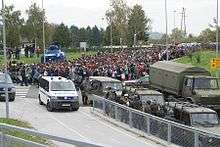 European migrant crisis in 2015
European migrant crisis in 2015 - 2015 – The "European migrant crisis" refers to an enormous and unprecedented wave of both war refugees from the Syrian civil war and economic migrants from the Near East and Africa. Germany became the first final destination of choice for refugees and asylum seekers taking in over 1 million refugees.
- 2015 – Iran and P5+1 (China, France, Russia, the UK, and the US + Germany), agree on final provisions of Joint Comprehensive Plan of Action in regards to the latter's nuclear program.
- 2015 – ISIL claimed responsibility of the shootings and suicide bombs in Paris on November 13, which became known as the November 2015 Paris attacks. Many were killed and injured from the incident.
- 2015 – Turkey shoots down a Russian Sukhoi Su-24M attack aircraft on 24 November. This was the first case of a NATO member destroying a Russian aircraft since the attack on the Sui-ho Dam (during the Korean War).
- 2015 – During the UN summit on Climate Change, 193 nations agree a process to reduce carbon emissions starting in 2020.
- 2016 – Rodrigo Duterte becomes the first Mindanaoan President of the Philippines, the first local chief executive to get elected straight to the presidency, the fourth visayan to be the President after Sergio Osmeña, Manuel Roxas and Carlos P. Garcia, and the oldest person ever elected to the presidency.
- 2016 – In Orlando, Florida, Omar Mateen, a 29-year-old security guard, killed 49 people and wounded 53 others in a terrorist attack inside Pulse, a gay nightclub.
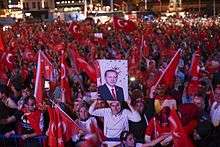 Turkish anti-coup rally in support of President Recep Tayyip Erdoğan, 22 July 2016
Turkish anti-coup rally in support of President Recep Tayyip Erdoğan, 22 July 2016 - 2016 – The United Kingdom, with the June 2016 membership referendum, decides to leave the European Union.
- 2016 – After 6 years of leadership, UK politician and Prime Minister David Cameron resigns and is replaced by Theresa May.
- 2016 – Hillary Clinton becomes the Democratic Party's nominee for president of the United States, making her the first woman to be nominated for president by a major party.
- 2016 – A coup d'état was attempted in Turkey against state institutions, including, but not limited to the government and President Recep Tayyip Erdoğan, on July 15. The attempt was carried out by a faction within the Turkish Armed Forces that organized themselves as the Peace at Home Council.
- 2016 – On September 2, the 1st President of Uzbekistan Islam Karimov dies at age of 78, after 25 years of leadership.
- 2016 – Israeli politician, former president of Israel and 1994 Nobel Peace Prize awardee Shimon Peres dies at the age of 93 from a massive stroke.
- 2016 – Thai longest-reigning monarch Bhumibol Adulyadej dies at the age of 88 from a long illness.
- 2016 – Donald Trump is elected as the 45th President of the United States. The first without a military or political background, and the oldest person elected to a first term. He is sworn into office in January 2017.
- 2016 – Cuban political and revolutionary leader Fidel Castro dies at the age of 90.
- 2016 – On December 19, Andrei Karlov, the Russian Ambassador to Turkey, was killed by Mevlüt Mert Altıntaş, a Turkish police officer.
- 2016 – On December 19, the Islamic State of Iraq and the Levant claimed responsibility for the 2016 Berlin attack in Germany. 12 people were killed and 49 others injured.
 U.S. President Donald Trump, King Salman of Saudi Arabia and Egyptian President Abdel Fattah el-Sisi touching The Orb at the 2017 Riyadh summit.
U.S. President Donald Trump, King Salman of Saudi Arabia and Egyptian President Abdel Fattah el-Sisi touching The Orb at the 2017 Riyadh summit. - 2017 – In opposition to Donald Trump's inauguration, millions of people in the U.S. and worldwide join the Women's March.
- 2017 – U.S. President Donald Trump signs an executive order on January 27, 2017, restricting travel and immigration from seven Muslim-majority countries. This order was blocked by the U.S. federal courts; a second, related order issued by Trump was also blocked by the federal courts. The block of second order was partially removed, by the Supreme Court, in June. The Supreme Court stated they would reconsider the order in October.
- 2017 – On April 6, in response to a suspected chemical weapons attack on a rebel-held town, the U.S. military launches 59 Tomahawk cruise missiles at Shayrat Airbase in Syria.
- 2017 – Philippine President Rodrigo Duterte declared martial law in Mindanao, following the Maute's attack in Marawi which lasted until October 23.
- 2017 – A terrorist drives into more than 100 people in Barcelona and Cambrils, Catalonia killing 13 and injuring many.
- 2017 – Catalonia declares independence from Spain,[42] but the Catalan Republic is not recognised by the Spanish government or any other sovereign nation.[43]
- 2018 – On January 13, a miscommunication during a routine test of the Emergency Alert System in Hawaii causes a false alert warning of an incoming ballistic missile to be issued over television, radio, and cellphones across the entire state. The message read, "BALLISTIC MISSILE THREAT INBOUND TO HAWAII. SEEK IMMEDIATE SHELTER. THIS IS NOT A DRILL."
- 2018 – Paula-Mae Weekes becomes the first female President of Trinidad and Tobago on the 19th of March.
- 2018 – In over 900 cities internationally, people participate in demonstrations against gun violence and mass shootings, calling for stronger gun control in the March for Our Lives, which was a student-led demonstration in response to the Stoneman Douglas High School shooting in Parkland, Florida that took place in February.
 Students from Marjory Stoneman Douglas High School, parents, and others march in the March for Our Lives protest in Parkland, FL in 2018.
Students from Marjory Stoneman Douglas High School, parents, and others march in the March for Our Lives protest in Parkland, FL in 2018. - 2018 – President Donald Trump and North Korean leader Kim Jong-un meet for the first time for the 2018 North Korea–United States summit in Singapore.
- 2018 – Jair Bolsonaro is elected as the 38th President of Brazil, the first military since 1985. Bolsonaro was stabbed during the election campaign and underwent three surgeries.
- 2019 – On January 10, Venezuela enters into a presidential crisis after the disputed results of the 2018 Venezuelan presidential election leads to Juan Guaidó being declared the acting president, opposing Nicolás Maduro.
- 2019 – President Donald Trump and North Korean leader Kim Jong-un meet for the 2019 North Korea–United States Hanoi Summit in Vietnam.
- 2019 – In March, the Islamic State terror organization's territory in Syria collapses amidst the Syrian Civil War. After years of global push back, the extremist group transitions from a proto-state into an insurgency as it retains offshoots and influence in regions across the globe.
- 2019 – Boris Johnson becomes Prime Minister of the United Kingdom after defeating Jeremy Hunt in a leadership contest, succeeding Theresa May.
- 2019 – Over 1 million people in Hong Kong protest against proposed legislation regarding extradition to China.
- 2019 – Sanna Marin, at the age of 34, becomes the world's youngest serving prime minister after being selected to lead Finland's Social Democratic Party.
- 2019 – On December 18, president Donald Trump was impeached by the United States House of Representatives.
- 2019 – The impending release of former Calauan, Laguna Mayor Antonio Sanchez, the mastermind in the rape and murder of Eileen Sarmenta and Allan Gomez in 1993, has sparked nationwide outrage and condemnation.
- 2019 – The Ampatuan brothers, Datu Andal Ampatuan Jr. and Zaldy Ampatuan, and 26 co-accused are convicted of 57 counts of murder and sentenced to reclusion perpetua (40 years) without parole for their participation at the Maguindanao massacre case.
2020s
- 2020 – A U.S. drone strike at Baghdad International Airport kills Iranian general Qasem Soleimani and Iraqi paramilitary leader Abu Mahdi al-Muhandis.
- 2020 – A worldwide pandemic of a novel coronavirus disease caused widespread socioeconomic disruption, including a stock market crash.
New countries and territorial changes
Some territories have gained independence during the 21st century. This is a list of sovereign states that have gained independence in the 21st century and have been recognized by the UN.




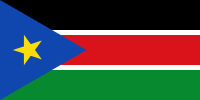
These territories have declared independence and secured relative autonomy but they have only been recognized by some UN member states:
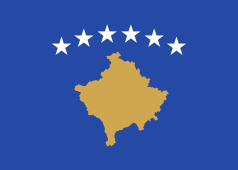


These territories have declared independence and secured relative autonomy but they have been recognized by no one:
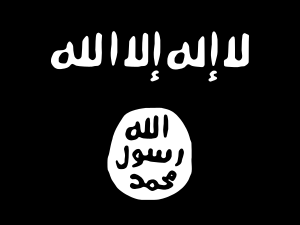

These territories were annexed from a sovereign country, the action has only been recognized by some UN member states:
Science and technology
Space exploration
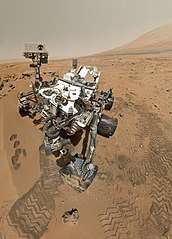

- 2001 – Dennis Tito becomes the first space tourist by paying $19 million to board the International Space Station.
- 2003 – Space Shuttle Columbia disaster February 1.
- 2003 – The Chinese space program launches its first manned space flight, Shenzhou 5, on October 15. This made China the third country in the world to have indigenous manned space capability.
- 2004 – Mars Exploration Rovers land on Mars; Opportunity discovers evidence that an area of Mars was once covered in water.
- 2004 – SpaceShipOne makes the first privately funded human spaceflight, June 21.
- 2005 – The Huygens probe lands on Titan, the largest of Saturn's moons, January 14.
- 2006 – The New Horizons probe is launched to Pluto, on January 19.
- 2006 – Pluto is reclassified from a planet to a dwarf planet, leaving the solar system with eight planets.
- 2007 – China launches its first lunar mission with the Chang'e 1, on October 24.
- 2008 – Chinese space program launches its third manned space flight carrying its first three-person crew and conducts its first spacewalk that makes China the third nation after Russia and USA to do that, Shenzhou 7, on September 25.
- 2008 – Phoenix discovers water ice on Mars.
- 2009 – Iran launches its first satellite, Omid, on February 2.
- 2009 – The Indian Space Research Organisation discovers water on the Moon.
- 2011 – NASA retires the last Space Shuttle, Atlantis, marking an end to its three-decade shuttle program.
- 2012 – The 50th successful launch in a row for the European launcher Ariane 5, on August 2.
- 2012 – SpaceX successfully delivers cargo to the International Space Station.
- 2012 – NASA successfully lands the Curiosity rover on the surface of Mars.
- 2014 – India's Mars Orbiter Mission, the nation's first attempt to send a spacecraft to Mars, successfully entered orbit on September 24, making India the fourth nation in the world to reach that goal.
- 2014 – The European Space Agency robotic spacecraft Philae landed successfully on the comet 67P, the first cometary landing ever.
- 2015 – On July 14, NASA's New Horizons spacecraft became the first to fly by Pluto, on a mission to photograph and collect data on its planetary system. No other spacecraft has yet performed such a mission so far from Earth.
- 2015 – On September 28, NASA announces that liquid water has been found on Mars.[45]
- 2016 – On July 4, NASA's Juno space probe maneuvered into a polar orbit to study the planet Jupiter.[46]
- 2017 – Seven Earth-sized exoplanets are discovered around TRAPPIST-1, three of which are potentially habitable.
- 2017 – SpaceX launches SES-10 on a re-used first stage, becoming the first re-flight of an orbital-class booster.
- 2019 – New Horizons performs a flyby of 486958 Arrokoth, the most distant object to be visited by a spacecraft.
- 2019 – Chinese probe Chang'e 4 becomes the first human-made object to land on the far side of the Moon.[47]
- 2019 – NASA concludes the 15-year Opportunity rover mission after being unable to wake the rover from hibernation.[48]
- 2019 – Israel launched its first spacecraft, Beresheet, towards the Moon on April 7; after two months of journey, the spacecraft failed to land and crashed on the surface of the Moon, what made Israel the seventh country to successfully orbit the Moon.
- 2019 – The first image of the supermassive black hole inside galaxy Messier 87 was captured by the Event Horizon Telescope.[49]
Physics
- 2003 – WMAP observations of the cosmic microwave background.
- 2010 – The Large Hadron Collider's first high energy collisions took place in March 2010.
- 2012 – Physicists discover the Higgs boson based on collisions at the Large Hadron Collider. It is the last particle of the Standard Model to be discovered.[50]
- 2013 – A more detailed study of the cosmic microwave background done by the Planck Surveyor is published, estimating the age of the Universe to 13.8 billion years old (100 million years older than previously thought).
- 2016 – LIGO announces the discovery of bursts of gravitational waves generated by cosmic collisions of black holes.
Mathematics
- 2002 – Grigori Perelman posted the first of a series of eprints to the arXiv, in which he proved the Poincaré conjecture, the first of the Millennium Prize Problems to be solved.
Biotechnology and medicine
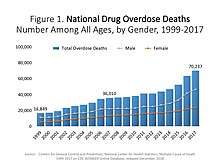
- 2003 – Completion of the Human Genome Project
- 2003 – Severe acute respiratory syndrome (SARS) spreads around the globe.
- 2005 – The first successful partial face transplant is performed in France.
- 2006 – Australian of the Year Dr Ian Frazer develops a vaccine for cervical cancer.
- 2007 – Visual prosthetic (bionic eye) Argus II.
- 2008 – Japanese scientists create a form of artificial DNA.
- 2008 – Laurent Lantieri performs the first full face transplant.
- 2009 – Influenza A virus subtype H1N1 spreads around the globe.
- 2012 – The first successful complete face transplant is performed in Turkey.
- 2012 – Doubts raised over Statin medication.
- 2013 – First kidney grown in vitro in the U.S.
- 2013 – First human liver grown from stem cells in Japan.
- 2014 – Ebola virus spreads in west Africa, prompting the then-largest epidemic, with more than 20,000 cases. The first cases outside Africa are reported.
- 2016 – The Zika virus, caused by mosquitoes, targets unborn babies, causing birth defects on newborns making some pregnant women afraid of traveling overseas.
- 2019 – A worldwide pandemic caused by the SARS-CoV-2 virus begins.
Telecommunications
The Digital Revolution continued into the early 21st century with mobile usage and Internet access growing massively, becoming available to more people and with more applications and faster speeds.
Social networking emerged in the late 2000s as a popular social communication, largely replacing much of the function of email, message boards and instant messaging services. Twitter, Facebook, YouTube and Snapchat are all major examples of social media to gain widespread popularity. The use of webcams and front-facing cameras on PCs and related devices, and services such as Skype and FaceTime, have made video calling and video conferencing widespread.
Civil unrest
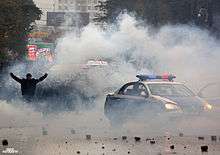


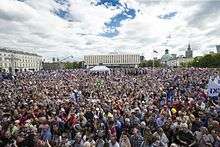
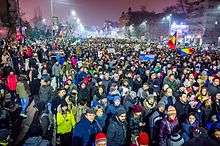
.jpg)
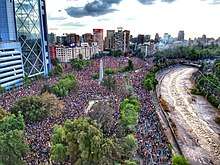
- Anti-globalization protests in Prague
- 2001 G8 Genoa summit protests
- December 2001 riots in Argentina
- 2002 Gujarat riots
- Protests against the Iraq War
- Bolivian gas conflict
- 2004–2005 Orange Revolution in Ukraine
- 2005 civil unrest in France
- 2007 Georgian demonstrations
- 2008 Tibetan unrest
- 2009 Icelandic financial crisis protests
- Tea Party protests
- 2009 G-20 London summit protests
- 2009–2010 Iranian election protests
- 2010 G-20 Toronto summit protests
- 2010 UK student protests
- 2010–2012 Greek protests
- Arab Spring
- Tunisian revolution
- 2011 Egyptian revolution
- 2011 Egyptian Post-Revolution protests
- Impact of the Arab Spring
- 2011 Iranian protests
- 2011 Libyan civil war
- Syrian civil war
- 2011 United Kingdom anti-austerity protests
- 2011 London anti-cuts protest
- Anti-austerity movement in Portugal
- Spanish "Indignants"
- 2011 England riots
- 2011–13 Chilean student protests
- 2011 Israeli social justice protests
- 15 October 2011 global protests
- Worldwide "Occupy" Protests
- 2011–2013 Russian protests
- Bersih 3.0 rally
- 2012 Catalan independence demonstration
- Yo Soy 132
- 2012–13 Iraqi protests
- Gezi Park protests
- 2013 protests in Brazil
- 2013 Egyptian coup d'état
- Catalan Way
- 2013–2014 Thai political crisis
- Euromaidan
- 2013 Italian social protests
- 2014 Ukrainian Revolution
- 2014 unrest in Bosnia and Herzegovina
- Venezuelan protests (2014–present)
- 2014 Pakistan anti-government protest
- 2014 Ferguson unrest
- 2014 Hong Kong protests
- 2015 Baltimore protests
- 2015 Lebanese protests
- Protests against Donald Trump
- Nuit debout
- 2016 Turkish coup d'état attempt
- 2016–17 South Korean protests
- Dakota Access Pipeline protests
- 2017–2019 Romanian protests
- 2017 Russian protests
- 2017 Brazilian general strike
- 2017 Catalan general strike
- Unite the Right rally
- 2017–2018 Honduran protests
- 2018–2019 Nicaraguan protests
- 2018–19 Iraqi protests
- Yellow vests movement
- Serbian protests (2018–present)
- Sudanese Revolution
- Extinction Rebellion protests
- 2018–2019 Haitian protests
- 2019–2020 Algerian protests
- 2019–2020 Hong Kong protests
- 2019 Venezuelan uprising attempt
- 2019 Papua protests
- 2019 Egyptian protests
- 2019 Ecuadorian protests
- 2019-20 Catalan protests
- 2019–2020 Chilean protests
- 2019–20 Lebanese protests
- 2019 Bolivian protests
- 2019–20 Iranian protests
- 2019 Maltese protests
- 2019 Colombian protests
- Citizenship Amendment Act protests
Linguistic diversity
As of 2009, SIL Ethnologue catalogued 6,909 living human languages.[51] The exact number of known living languages will vary from 5,000 to 10,000, depending generally on the precision of one's definition of "language", and in particular on how one classifies dialects.
Estimates vary depending on many factors but the general consensus is that there are between 6,000 and 7,000 languages currently spoken, and that between 50–90% of those will have become extinct by the year 2100.[52] The top 20 languages spoken by more than 50 million speakers each, are spoken by 50% of the world's population, whereas many of the other languages are spoken by small communities, most of them with fewer than 10,000 speakers.[52]
Disasters
Natural disasters
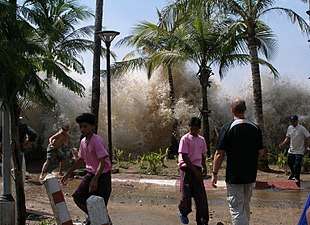
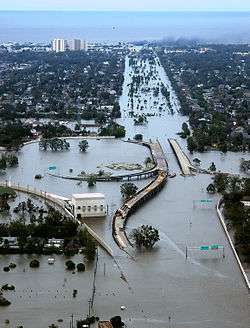
2000s
- 2001 Gujarat earthquake – An earthquake in Gujarat, India on January 26, 2001 killed approximately 20,000 people.
- January 2001 El Salvador earthquake – A 7.9 earthquake in El Salvador shook the whole country on January 13, 2001, causing a major devastating landslide, hundreds dead, thousands injured and many homeless. A month later, on February 13, 2001 the country suffered a second earthquake – 6.7
- 2003 European heat wave – Approximately 30,000 people were killed across Europe in a summer long heat wave.
- 2003 Bam earthquake – An earthquake in Bam, Iran on December 27, 2003, killed more than 26,000.
- 2004 Hurricane Jeanne – Over 3,000 people are killed by Hurricane Jeanne in Haiti in September 2004.
- 2004 Indian Ocean earthquake and tsunami – On December 26, 2004, a massive undersea earthquake resulted in a massive tsunami striking southeast Asia killing approximately 230,000.
- 2005 Hurricane Katrina – The hurricane killed 1,836 in southeast Louisiana and Mississippi (mostly in New Orleans) and South Florida. A significant portion of the city, most of which sits below sea level, was submerged. Damages reached US$81.5 billion, making Katrina the costliest tropical cyclone ever recorded in the U.S.
- 2005 Kashmir earthquake – An earthquake in Kashmir on October 8, 2005, killed at least 74,500 in India and Pakistan.
- 2008 Cyclone Nargis – lead to catastrophic storm surge, leading to a death toll in excess of 100,000 and making millions homeless.
- 2008 Sichuan earthquake – An earthquake between 7.9 and 8.0-magnitude struck Sichuan, China, on May 12, 2008, killing 68,712, with 17,921 missing.
- 2009 Black Saturday bushfires – The Black Saturday bushfires were a series of bushfires that ignited or were burning across the Australian state of Victoria, Australia on and around Saturday, February 7, 2009. The fires occurred during extreme bushfire-weather conditions and resulted in Australia's highest ever loss of life from a bushfire; 173 people died and 414 were injured.
- 2009 L'Aquila earthquake – A 6.3 magnitude earthquake strikes near L'Aquila (Italy) on April 6, 2009, one of the worst in Italian history. 308 were pronounced dead and more than 65,000 were made homeless.
- 2009 flu pandemic – A worldwide outbreak of Influenza A virus subtype H1N1 spread around the world forming a pandemic by June 2009.
2010s
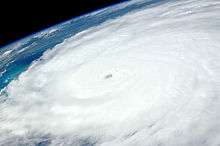
.jpg)
- 2010 Haiti earthquake – At least 230,000 are killed in Haiti after a massive earthquake on January 12, 2010. As of late February 2010, the death toll is expected to rise. Three million people were made homeless.
- 2010 Chile earthquake – A massive earthquake, magnitude 8.8, strikes the central Chilean coast on February 27, 2010.
- 2010 Yushu earthquake – A large 6.9 magnitude earthquake struck the Yushu region of China in Qinghai near Tibet, on April 14, 2010, killing over 2,200 people.
- 2010 eruption of Eyjafjallajökull – A massive ash cloud is formed by the eruption of the Icelandic volcano Eyjafjallajökull, on April 14, 2010, grounding flights across northwest Europe. Scientists began recording volcanic activity there in 2009 which increased through March 2010 culminating in the second phase eruption in April.
- 2010 Pakistan floods – Began in July 2010 after record heavy monsoon rains. The Khyber Pakhtunkhwa province of Pakistan was worst affected. At least 1,600 people were killed, thousands were rendered homeless, and more than thirteen million people were affected.[53][54][55][56][57] Estimates from rescue service officials suggest the death toll may reach 3,000 victims.[58]
- 2011 Queensland floods – Began in December 2010 primarily in Queensland. The flood causes thousands of people to evacuate. At least 200,000 people were affected by the flood. The flood continued throughout January 2011 in Queensland, and the estimated reduction in Australia's GDP is about A$30 billion.
- Cyclone Yasi – A category 5 (Australian Scale) cyclone hits North Queensland with winds as strong as 290 km/hr (197 miles/hr) and devastates the residents of North Queensland.
- February 2011 Christchurch earthquake – 185 people died in New Zealand after a 6.3-magnitude earthquake hit Christchurch on February 22, 2011, making it New Zealand's second-deadliest natural disaster after the 1931 Hawke's Bay earthquake.
- 2011 Tōhoku earthquake and tsunami – On March 11, 2011, a catastrophic undersea earthquake of magnitude 9.0 occurred offshore of eastern Japan, the greatest in the country's history and created a massive tsunami which killed 15,894; it also triggered the Fukushima I nuclear accidents. The overall cost for the earthquake, tsunami and nuclear accidents reached up to US$235 billion, making it the costliest natural disaster on record.
- 2011 Super Outbreak – Regarded as the deadliest tornado outbreak ever recorded and dubbed the 2011 Super Outbreak, a catastrophic tornado outbreak on April 25–28 affected the Southern United States and killed over 330 people, most of whom were in or from Alabama. Damages are expected to be near or over $10 billion.
- 2011 Joplin tornado – On May 22, 2011, a devastating EF5 tornado struck Joplin, Missouri resulting in 159 casualties, making it the deadliest tornado to hit the United States since 1947.
- Tropical Storm Washi – Locally known as Sendong, it caused catastrophic flooding in the Philippine island of Mindanao on the night of December 16, 2011. The hardest hits were in Cagayan de Oro and Iligan City. Almost 1000 people perished, most of whom were sleeping, and President Benigno Aquino III declared a state of calamity four days later.
- Hurricane Sandy – October 24–30, 2012 – kills at least 185 people in the Caribbean, Bahamas, United States and Canada. Considerable storm surge damage causes major disruption to the eastern seaboard of the United States.[59][60][61]
- Typhoon Haiyan 2013 – kills more than 6,000 people in central Philippines. Considered to be one of the strongest storms ever, it brought major damage and loss of life to the Philippines, especially the islands of Leyte and Samar. A worldwide humanitarian effort began in the aftermath of the typhoon.
- 2014 Southeast Europe floods – kill at least 80 people in Bosnia and Herzegovina and Serbia. Floodwaters caused over 2,000 landslides across the Balkan region, spreading damage across many towns and villages.
- April 2015 Nepal earthquake – An earthquake of 7.8 magnitude kills almost 9,000 people, injures another 22,000 and leaves nearly 3 million people homeless in Central Nepal. The earthquake was so strong it was felt in India, Pakistan and Bangladesh.
- 2016 Taiwan earthquake – An earthquake of 6.4 magnitude kills 117 people, injures 550, and 4 people were left missing. The earthquake resulted in 3 executives of the Weiguan developer being arrested under charges of professional negligence resulting in death.
- August 2016 Central Italy earthquake - A 6.2 magnitude earthquake killed 299 people and severely damaged Amatrice, Accumoli and Arquata del Tronto.
2020s
- The outbreak of a new coronavirus disease, first identified in Wuhan, Hubei Province, China, spreads about the world, resulting in a pandemic.
Man-made disasters

- On July 27, 2002, a Sukhoi Su-27 fighter crashes at an air show in Ukraine, killing 77 and injuring more than 100, making it the worst air show disaster in history.
- On February 1, 2003, at the conclusion of the STS-107 mission, the Space Shuttle Columbia disintegrates during reentry over Texas, killing all seven astronauts on board.
- The Black Saturday bushfires – the deadliest bushfires in Australian history took place across the Australian state of Victoria on February 7, 2009 during extreme bushfire-weather conditions, resulting in 173 people killed, more than 500 injured, and around 7,500 homeless. The fires came after Melbourne recorded the highest-ever temperature (46.4 °C, 115 °F) of any capital city in Australia. The majority of the fires were ignited by either fallen or clashing power lines or deliberately lit.
- On April 10, 2010, Polish President Lech Kaczyński, his wife and 94 other people, including dozens of government officials, are killed in a plane crash.
- On April 20, 2010, an explosion on the Deepwater Horizon offshore drilling rig, operating in the Gulf of Mexico off the coast of Louisiana, left eleven crewmen dead and resulted in a fire that sank the rig and caused a massive-scale oil spill[62] that may become one of the worst environmental disasters in United States history.[63] On June 18, 2010 oceanographer John Kessler said that the crude gushing from the well contains 40 percent methane, compared to about 5 percent found in typical oil deposits. Methane is a natural gas that could potentially suffocate marine life and create "dead zones" where oxygen is so depleted that nothing lives. "This is the most vigorous methane eruption in modern human history," Kessler said.[64] On June 20 an internal BP document was released by Congress revealing that BP estimated the flow could be as much as 100,000 barrels (4,200,000 US gallons; 16,000 cubic metres) per day under the circumstances that existed since the April 20 blowout.[65][66]
Economics and industry

- The late-2000s financial crisis caused the Great Recession, which lasted into the early 2010s.
- The European sovereign-debt crisis sent Europe's economy into decline, having a major effect on European politics and contributing to power shifts and the introduction of austerity policies in different countries.
- Developing countries make up for 97% of the world's growth, and industrialization leads to the rapid rise of BRIC economies, producing less of an American-lead hegemony in the world economy.
Sports
At the start of the 21st century, sports are very popular. The IOC's Modern Olympic Games was the most viewed sporting event. Association football is the most popular sport worldwide with the FIFA World Cup the most viewed football event. Other sports such as rugby, cricket, baseball, basketball, ice hockey, tennis, and golf are popular globally. In cricket, the emergence of the Twenty20 format and the creation of the Indian Premier League led to changes in the nature of the sport. American swimmer Michael Phelps won an Olympic record setting 8 Gold medals at the 2008 Summer Olympics.

Golf
- The 2002 Ryder Cup was won by Europe 15 and a half to USA's 12 and a half.
- The 2004 Ryder Cup was won by Europe 18 and a half to USA's 9 and a half.
- The 2006 Ryder Cup was won by Europe again 18 and a half to USA's 9 and a half.
- The 2008 Ryder Cup was won by USA 16 and a half to Europe's 11 and a half.
- The 2010 Ryder Cup was won by Europe 14 and a half to USA's 13 and a half.
- The 2012 Ryder Cup was won by Europe 14 and a half to USA's 13 and a half.
- The 2014 Ryder Cup was won by Europe 16 and a half to USA's 11 and a half
- The 2016 Ryder Cup was won by USA 17 to Europe's 11.
- 2016 – Death of Arnold Palmer
Motorsport

- Dale Earnhardt passed away after a last-lap crash during the Daytona 500 in February 2001.
- NASCAR surpassed the Indianapolis 500 as the most popular motorsport in the United States.
- Michael Schumacher broke many records in the first few years of the century, including the record for most races won (91), most World Championships (7), and most pole positions (68) by the time he retired in 2006. In 2010, he announced his comeback to Formula One after three years out of the sport, retiring again in 2012.
- Sebastian Vettel broke numerous records on his way to becoming Formula One's youngest ever world champion, in 2010 at age 23, and then the youngest ever double world champion, in 2011 at age 24.
- Sébastien Loeb became the most successful rally driver ever, winning the World Rally Championship a record 9 consecutive times between 2004–2012. He also set new records for the most wins, podium finishes and points scored.
- Casey Stoner won his second MotoGP world title (2007 and 2011), and announced his retirement from the sport at just 27 years of age, citing disagreement with the direction of the sport and a desire to spend more time with his family. His retirement became effective at the end of the 2012 MotoGP season. Stoner has won every MotoGP-branded race at least once.
- Craig Lowndes became the first driver to reach 100 race wins in the V8 Supercars Championship.
- Lewis Hamilton broke the record for most pole positions in Formula One which is now 85 pole positions.
Rugby Union
- 2003 Rugby World Cup – host Australia – was won by England
- 2007 Rugby World Cup – host France – was won by South Africa
- 2011 Rugby World Cup – host New Zealand – was won by New Zealand
- 2015 Rugby World Cup – host England – was won by New Zealand
- 2019 Rugby World Cup – host Japan – was won by South Africa
Tennis (Men)
- Roger Federer won 20 Grand Slam titles (6 Australian Opens, 1 French Open, 8 Wimbledons, and 5 US Opens) to surpass Pete Sampras' record of 14.
- Roger Federer, Rafael Nadal and Novak Djokovic each completed a Career Grand Slam, winning the singles championships in the Australian Open, French Open, Wimbledon and US Open; Nadal also won the Olympic Singles gold medal in the 2008 Beijing Summer Olympics to complete a Golden Career Slam.
- At the 2010 Wimbledon Championships, John Isner and Nicolas Mahut completed the longest tennis match ever. Isner won 6–4, 3–6, 6–7(7), 7–6(3), 70–68.
- In 2019, Rafael Nadal became the first male player to win a single Grand Slam tournament (French Open) 12 times.
Tennis (Women)
- Serena Williams won 22 Grand Slam titles (7 Australian Opens, 3 French Opens, 7 Wimbledons, and 5 US Opens) in the 21st century, to add to her 1999 US Open title.
- Maria Sharapova became the first female Russian player to reach No.1 on August 22, 2005.
- China's Li Na won the 2011 French Open, becoming the first player, male or female, from that country to win a Grand Slam.
- Belarusian Victoria Azarenka won the 2012 Australian Open, becoming the first player, male or female, from that country to win a Grand Slam, and also hold the No.1 ranking (taking over from Caroline Wozniacki).
Arts and entertainment
Arts
- Art:21 - Art in the 21st Century (2001-2018), a PBS series
Music
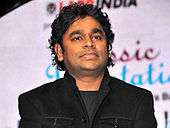
At the beginning of the century, the compact disk was the standard form of music media, but alternative forms of music media started to take it place such as music downloading and online streaming. A slight resurgence in vinyl records started to take place in the 2010s.
Issues and concerns
- Global warming. Climate scientists have reached a consensus that the earth is undergoing significant anthropogenic (human-induced) global warming.[68] The resulting economic and ecological costs are hard to predict. Some scientists argue that human-induced global warming risks considerable losses in biodiversity and ecosystem services unless considerable sociopolitical changes are introduced, particularly in patterns of mass consumption and transportation.[69]
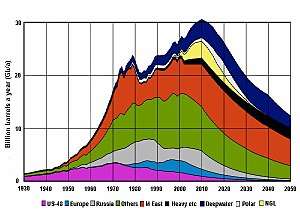
- Globalization. Advances in telecommunications and transportation, the expansion of capitalism and democracy since the late 1980s, and free trade agreements have resulted in unprecedented global economic and cultural integration. Most economists believe free trade leads to economic growth and benefits most people, including small businesses.[70] In recent years, however, there has been a backlash against globalization and a return to protectionist attitudes among some leaders and nations, most notably United States President Donald Trump and the United Kingdom's decision to leave the European Union.
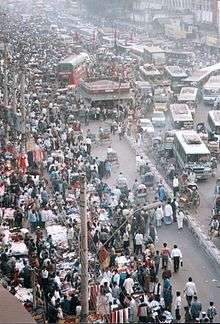
- Population. The world's population demographics will shift considerably in this century, with the population of Europe and East Asia to decline considerably and the population of Africa and to a lesser extent South Asia to grow considerably. The United Nations estimates that world population will reach 9.8 billion by the year 2050.[72] Most of this growth will take place in the world's poorer countries, which may slow down the global reduction of poverty and combined with the effects of global warming may lead to large migrations.
- Overpopulation. The United Nations estimates that world population will reach 9.2 billion by mid-century. Such growth raises questions of ecological sustainability and creates many economic and political disruptions. In response, many countries have adopted policies which either force or encourage their citizens to have fewer children, and others have limited immigration. Considerable debate exists over what the ultimate carrying capacity of the planet may be; whether or not population growth containment policies are necessary; to what degree growth can safely occur thanks to increased economic and ecological efficiency; and how distribution mechanisms should accommodate demographic shifts. Many developed countries (most notably Japan) will experience population decline, and the population debate is strongly tied with discussions about the distribution of wealth.
- Poverty. Poverty remains the root cause of many of the world's other ills, including famine, disease, and insufficient education. Poverty contains many self-reinforcing elements (for instance, poverty can make education an unaffordable luxury, which tends to result in continuing poverty) that various aid groups hope to rectify in this century. Immense progress has been made in reducing poverty, especially in China and India but increasingly in Africa as well. Microcredit lending has also started to gain a profile as a useful anti-poverty tool.
- Disease. AIDS, tuberculosis and malaria each kill over a million people annually. HIV remains without a cure or vaccine, and while new cases are declining it remains a major problem, especially for women.[73] Antibiotic resistance is a growing concern for organisms such as tuberculosis. Other diseases, such as SARS, ebola, the Zika virus and flu variations, are also causes for concern. The World Health Organization has warned of a possible coming flu pandemic resulting from bird flu mutations. In 2009, there was an outbreak of swine flu whose country of origin is still unknown.
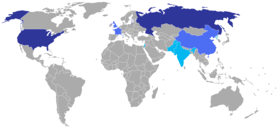 In early 2019, more than 90% of world's 13,865 nuclear weapons were owned by Russia and the United States.[74]
In early 2019, more than 90% of world's 13,865 nuclear weapons were owned by Russia and the United States.[74] - War and terrorism. Although war and terror have declined so far in the early 21st century,[75] active conflicts continue around the world, such as the Syrian Civil War, the Yemeni Civil War and the War in Afghanistan. The 9/11 terrorist attacks triggered invasions of Afghanistan and partially and controversially Iraq. The War on Terror has seen controversies over civil liberties, accusations of torture, continued terrorist attacks and ongoing instability, violence, and military occupation. Violence continues in the Arab–Israeli conflict. Considerable concern remains about nuclear proliferation, especially in Iran and North Korea, and the availability of weapons of mass destruction to rogue groups.
- War on drugs. Increasingly, the legal, social and military battle led by governments against drug cartels around the world show little results in ending drug trading and consumption, and a constant increase in the lives taken from this struggle. Notably, after 2006 in the Mexican Drug War, more than 100,000 human lives have been lost to this conflict. Some jurisdictions have enacted some degree of legalization or decriminalization of some kinds of drugs, notably including several U.S. states legalizing marijuana either for recreational or medical use.
- Intellectual property. The increasing popularity of digital formats for entertainment media such as movies and music, and the ease of copying and distributing it via the Internet and peer-to-peer networks, has raised concerns in the media industry about copyright infringement. Much debate is proceeding about the proper bounds between protection of copyright, trademark and patent rights versus fair use and the public domain, where some argue that such laws have shifted greatly towards intellectual property owners and away from the interests of the general public in recent years, while others say that such legal change is needed to deal with a perceived threat of new technologies against the rights of authors and artists (or, as others put it, against the outmoded business models of the current entertainment industry). Domain name "cybersquatting" and access to patented drugs and generics to combat epidemics in third-world countries are other IP concerns.
- Technology developments continue to change society. Communications and control technology continues to augment the intelligence of individual humans, collections of humans, and machines. Some, notably Ray Kurzweil, have predicted that by the middle of the century there will be a technological singularity if artificial intelligence that outsmarts humans is created. In addition, some economists have expressed concerns over technological unemployment.
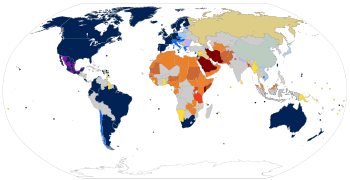 Marriage open to same-sex couplesDeath penalty for homosexuality
Marriage open to same-sex couplesDeath penalty for homosexuality - Civil rights, including women's rights, LGBT rights, racial equality and the rights of disabled and neurodiverse people are still a work in progress. Women are not able to realize or are outright denied their rights in many countries, including India, China[76] and Saudi Arabia, and sexual violence against women is still an enormous problem everywhere in the world. Sex-selective abortion has reduced the number of women born worldwide since 1990, mostly because of son preference in China, India, Pakistan, Vietnam, South Korea and some other smaller countries. In many countries attitudes towards homosexuality have become more tolerant. Same-sex marriage was legalized in several jurisdictions during the first two decades of the century, but outlawed by constitutional amendment in other places. Meanwhile, some countries such as Uganda and Russia moved to toughen their laws against any sort of homosexual behavior or expression. Political battles over pro- or anti-gay legislation provoked much activism in the streets and on the Internet. Hate groups remain a serious problem, and ethnic minorities have a lower status in many countries, including the United States. Neurological conditions such as autism are slowly becoming more understood and recognized.
Astronomical events
List of the long central solar eclipses
- Solar eclipse of July 22, 2009, total of 6 min 38.8 s, saros 136.
- Solar eclipse of January 15, 2010, annular of 11 min 08 s, saros 141. The longest of the century, and also of the entire millennium.
- Solar eclipse of August 2, 2027, total of 6 min 23 s, saros 136.
- Solar eclipse of January 26, 2028, annular of 10 min 27 s, saros 141.
- Solar eclipse of August 12, 2045, total of 6 min 06 s, saros 136.
- Solar eclipse of February 5, 2046, annular of 9 min 42 s, saros 141.
- Solar eclipse of August 24, 2063, of 5 min 49 s, saros 136.
- Solar eclipse of February 17, 2064, annular of 8 min 56 s, saros 141.
- Solar eclipse of May 11, 2078, total of 5 min 40 s, saros 139.
- Solar eclipse of November 4, 2078, annular of 8 min 29 s, saros 144.
- Solar eclipse of May 22, 2096, total of 6 min 07 s, saros 139.
- Solar eclipse of November 15, 2096, annular of 8 min 53 s, saros 144.
Other phenomena
- 2004: Transit of Venus.
- December 23, 2007: grand conjunction, a galactic conjunction which happens every 26,000 years.
- 2009: Triple conjunction Jupiter–Neptune.
- 2012: Transit of Venus.
- November 11, 2019: Transit of Mercury.
- Friday, April 13, 2029: The asteroid 99942 Apophis (previously better known by its provisional designation 2004 MN4) will pass within 30,000 km (18,600 mi) of the Earth.
- July 2061: Next return of Halley's Comet.
- 2063: Triple conjunction Mars-Uranus.
- November 11, 2065: Transit of Mercury.
- November 22, 2065: At 12:45 UTC, Venus will occult Jupiter. This event will be the first occultation of a planet by another since January 3, 1818. This event will be very difficult to observe from Earth's surface, because the elongation of Venus and Jupiter from the Sun on that date will be only 7 degrees.
- 2066: Triple conjunction Jupiter-Uranus.
- July 15, 2067: At 11:56 UTC, Mercury will occult Neptune. This rare event will be very difficult to observe from Earth's surface, because of the constant low elongation of Mercury from the Sun, and the magnitude of Neptune always under the limit of visibility with the naked eye.
- Friday, November 10, 2084: Transit of Earth as seen from Mars, the first and the only one in this century.
- November 7, 2085: Transit of Mercury.
- 2100: Polaris appears furthest north. Polaris' maximum apparent declination (taking account of nutation and aberration) will be 0.4526° from the celestial north pole, on March 24, 2100.[77]
See also
- 21st century in fiction
- Timelines of modern history
- Contemporary art
References
- "The 21st Century and the 3rd Millennium". aa.usno.navy.mil. Retrieved November 6, 2018.
- "Majority of Americans distrust the government". Reuters. April 19, 2010. Retrieved June 1, 2015.
- David A. Lake. "Rational Extremism: Understanding Terrorism in the Twenty-first Century" (PDF). quote.ucsd.edu. Retrieved June 1, 2015.
- "Working with Private Industry | Research Pages | The Stimson Center | Pragmatic Steps for Global Security". www.stimson.org. Retrieved June 1, 2015.
- https://www.newscientist.com/article/2146594-eight-low-lying-pacific-islands-swallowed-whole-by-rising-seas/
- https://www.scientificamerican.com/article/township-in-solomon-islands-is-1st-in-pacific-to-relocate-due-to-climate-change/
- https://www.environment.gov.au/climate-change/adaptation/international-climate-change-adaptation-initiative/pasap/solomon-islands
- Fisher, Marc (December 20, 2011). "Arab Spring yields different outcomes in Bahrain, Egypt and Libya". The Washington Post. ISSN 0190-8286. Retrieved March 19, 2020.
- Satell, Greg. "Why The Digital Revolution Is Really Just Getting Started". Retrieved June 1, 2015.
- Digital in 2018: World's internet users pass the 4 billion mark
- "The Cost of Sequencing a Human Genome". Genome.gov.
- Molteni, Megan (November 19, 2018). "Now You Can Sequence Your Whole Genome for Just $200" – via www.wired.com.
- Bansal, Samarth (November 30, 2016). "Sex ratio at birth on the decline" – via www.thehindu.com.
- "Is anxiety increasing in the United States?". Medical News Today.
- "Depression". who.int.
- Stack, Steven. "Why is suicide on the rise in the US – but falling in most of Europe?". The Conversation.
- "Why the global suicide rate is falling". November 30, 2018 – via The Economist.
- Carlson, Benjamin (July 3, 2010). "Quote of the Day: Google CEO Compares Data Across Millennia". The Atlantic.
- "Eric Schmidt: Every 2 Days We Create As Much Information As We Did Up To 2003".
- https://i.imgur.com/gpXRWoq.png
- "Number of mobile phone users worldwide 2015-2020". Statista.
- "Database". iea.org.
- Pruitt, Sarah. "China Makes Historic Landing on 'Dark Side' of the Moon". HISTORY.
- "By 2030, world will have 8.6bn people, 1.5bn of them in India". June 23, 2017 – via The Economic Times.
- https://esa.un.org/unpd/wup/publications/files/wup2014-highlights.pdf
- "10 million Brits alive today will live to see their 100th birthday". uk.news.yahoo.com.
- "Climate change: An 'existential threat' to humanity, UN chief warns global summit". UN News. May 15, 2018.
- Ceballos, Gerardo; Ehrlich, Paul R. (June 8, 2018). "The misunderstood sixth mass extinction". Science. 360 (6393): 1080–1081. doi:10.1126/science.aau0191. OCLC 7673137938. PMID 29880679.
- Reporter, B. S. (April 30, 2014). "India larger than Japan in PPP terms, says WB" – via Business Standard.
- https://danielmiessler.com/images/mfg1.jpg
- "Google Image Result". google.com.
- https://i1.wp.com/www.brookings.edu/wp-content/uploads/2019/02/fig7-automation-education.jpg?w=768&crop=0%2C0px%2C100%2C9999px&ssl=1
- CEO, Stephane Kasriel, Upwork (October 31, 2018). "The future of work won't be about degrees, it will be about skills". cnbc.com.
- Johnston, Chris (May 26, 2017). "Call to raise retirement age to at least 70". BBC News.
- Emily Jane Fox. "Retirement age must rise – OECD".
- "Login".
- TASCHEN. "The Stanley Kubrick Archives". Retrieved October 6, 2014.
- "Estimated casualties in Iraq". Retrieved October 6, 2014.
- O'Neil, John; Onishi, Norimitsu (October 15, 2006). "US confirms nuclear claim". New York Times.
- "Archived copy". Archived from the original on 27 September 2013. Retrieved 25 May 2010.CS1 maint: archived copy as title (link) PNM lose to Peoples Partnership in Trinidad elections 2010]. ttgapers.com 24 May 2010.
- Skard, Torild (2014) "Kamla Persad-Bissessar" in Women of power – half a century of female presidents and prime ministers worldwide, Bristol: Policy Press ISBN 978-1-44731-578-0, pp. 271–3
- "Catalonia declares independence from Spain as political crisis deepens". CNN. October 27, 2017. Retrieved October 27, 2017.
- "Catalans declare independence as Madrid imposes direct rule". BBC. October 27, 2017. Retrieved October 27, 2017.
- Grolier- the new book of knowledge, section "E"
- "NASA News Conference: Evidence of Liquid Water on Today's Mars". NASA. September 28, 2015.
- Greicius, Tony (March 13, 2015). "Juno Overview". Retrieved July 23, 2016.
- Moss, Trefor (January 3, 2019). "China Lands Probe on the 'Dark Side' of the Moon". The Wall Street Journal. Retrieved January 3, 2019.
- Ryan, Jackson (February 13, 2019). "NASA's history-making Mars rover Opportunity declared dead". CNET. Retrieved February 14, 2019.
- Grossman, Lisa; Conover, Emily (April 10, 2019). "The first picture of a black hole opens a new era of astrophysics". Science News. Retrieved April 11, 2019.
- "Higgs boson-like particle discovery claimed at LHC". BBC News. Retrieved October 6, 2014.
- "Ethnologue: Languages of the World, Fifteenth edition". Retrieved June 28, 2007, ISBN 1-55671-159-X
- Roell, Craig. Battle of Coleto. Handbook of Texas.
- Bodeen, Christopher (August 8, 2010). "Asia flooding plunges millions into misery". The Associated Press. Archived from the original on September 4, 2010. Retrieved August 8, 2010.
- Masood, Salman and Adam B. Ellick. Floods in Pakistan Kill at Least 700. NYTimes.
- "UN voices Pakistan flood fears as death toll soars". BBC. July 31, 2010. Retrieved July 31, 2010.
- Khan, Ismail (July 30, 2010). "400 Killed in Flooding in Pakistan, Officials Say". The New York Times. Retrieved July 30, 2010.
- "Thousands trapped by Pakistan floods; 900 dead". Archived from the original on August 12, 2010. Retrieved October 6, 2014.
- "Deaths From Pakistan Floods May Reach 3,000, Rescue Service Official Says". Bloomberg. July 31, 2010. Archived from the original on October 6, 2014. Retrieved October 6, 2014.
- CNN Report: Superstorm Sandy. Retrieved October 30, 2012.
- Cleveland News Superstorm Sandy. Retrieved October 30, 2012.
- Telegraph.co.uk News Report. October 30, 2012.
- "BP Will Pay For Gulf Oil Spill Disaster, CEO Says". NPR. May 3, 2010. Archived from the original on May 4, 2010. Retrieved May 3, 2010.
- "Choppy Seas Hinder Effort To Contain Oil Spill", National Public Radio, April 30, 2010
- "Oil spill full of methane, adding new concerns". msnbc. June 18, 2010. Retrieved June 20, 2010.
- "Document Shows BP Estimates Spill up to 100,000 Bpd". ABC News. June 20, 2010. Archived from the original on June 24, 2010. Retrieved June 20, 2010.
- "Seafloor Exit" (PDF). Archived from the original (PDF) on July 4, 2010. Retrieved May 14, 2013.
- Kroll, Luisa (March 6, 2018). "Forbes Billionaires 2018: Meet The Richest People On The Planet". Forbes.
- Oreskes, Naomi (2004). "The Scientific Consensus on Climate Change". Science. 306 (5702): 1686. doi:10.1126/science.1103618. PMID 15576594. Retrieved October 6, 2014.
- "What the World Would Look Like if All the Ice Melted". September 1, 2013. Retrieved March 21, 2018.
- Partington, Richard (August 13, 2018). "Is free trade always the answer?" – via www.theguardian.com.
- World population projected to reach 7 billion in 2011 ". CNN. August 12, 2009.
- "World population projected to reach 9.8 billion in 2050, and 11.2 billion in 2100". UN DESA - United Nations Department of Economic and Social Affairs. June 21, 2017.
- "Global HIV and AIDS statistics". AVERT. July 16, 2015.
- "Global Nuclear Arsenal Declines, But Future Cuts Uncertain Amid U.S.-Russia Tensions". Radio Free Europe/Radio Liberty. June 17, 2019.
- Sanger-Katz, Margot (August 16, 2016). "Is Terrorism Getting Worse? In the West, Yes. In the World, No" – via NYTimes.com.
- https://www.du.edu/korbel/hrhw/researchdigest/china/WomenChina.pdf
- Jean Meeus, Mathematical Astronomy Morsels Ch.50 ; Willmann-Bell 1997.
Notes
External links
| Wikimedia Commons has media related to 21st century. |
- Reuters – The State of the World The story of the 21st century
- Long Bets Foundation to promote long-term thinking
- Long Now Long-term cultural institution
- Scientific American Magazine (September 2005 Issue) The Climax of Humanity
- MapReport 21st Century Event World Map
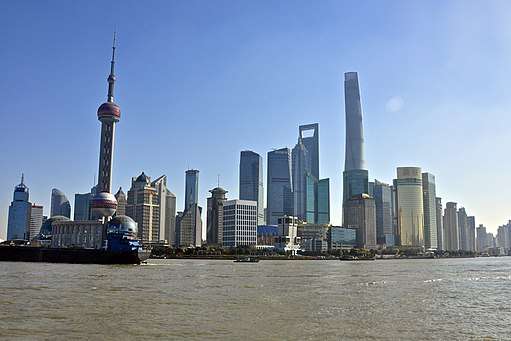

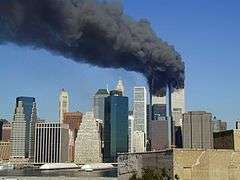
.jpg)
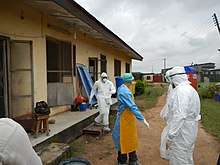
.jpg)